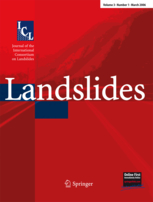Ha Long landslide
LCI : VNM161020844| Main Information | |
| Landslide Name | : Ha Long landslide |
| Latitude | : 20°:57':29.91 N |
| Longitude | : 107° :6':10.26 E |
| Location | |
| City / District | : HaLong |
| Province | : QuangNinh |
| Country | : Vietnam |
| Reporter | |
| Reporter 1 | : Doan Loi |
| Reporter 2 | : Quang Lam |
| Landslide Type | |
| Material | : Earth |
| Movement | : Slide |
| Velocity (mm/sec) | : Rapid |
| Depth (m) | : Shallow |
| Slope (degree) | : Gentle |
| Volume (m³) | : Small |
| Date of Occurence | |
| Date of Occurence | : Jul 28, 2015 |
| Other Information | |
| Land Use |
Source area : Forest, Urban area Run-out/deposition area : Urban area |
| Other Activity | : - |
| Triggering Factor | : Rainfall |
| Death(s) & Missing | : 8 |
| Houses and other structural damage | : 3 |
| Photo of landslide | :  |
| Google earth kmz file | : Ha Long landslide.kmz |
| Plan of landslide | : |
| Cross section of landslide | :  |
| Reference (paper/report) | : - |
| Testing graph | : |
| Monitoring graph | :  |
| Video of moving landslides including 3D simulation | : - |
| Description | : |
On 28 July 2015, around 01:00 local time, a catastrophic landslide occurred at Cao Thang ward, Ha Long city, Quang Ninh province, Vietnam. The landslide claimed 8 lives and destroyed 3 houses. It was the most significant disaster triggered by torrential rains in Vietnam in 2015. Total recorded rainfalls in a number of gauging stations in Quang Ninh province during 26-30 July were historically the highest in the last 40 years . The cumulative rainfall from 19:00, 27 July, until 07:00, 28 July was 296 mm at Bai Chay weather station in Ha Long city. The heavy rain was the main cause of the Ha Long disaster. Ha Long city is located in the center of Quang Ninh province where there is complex and diverse coastal topography including hills, delta, and islands. It is a highly urbanized and rapidly growing city (population 221,580 in 2010). Many of its people live in hilly areas prone to landslides and debris flows. The North and North East are covered by hills, containing the 70% city’s area. Altitude ranges from sea level to 504 m. Ha Long has a tropical coastal climate with two seasons. A summer season lasts from May to October; the winter from November to April. The average annual precipitation is 1800mm with 80 – 85 % of the annual average falling in summer, especially in July and August. |
|




